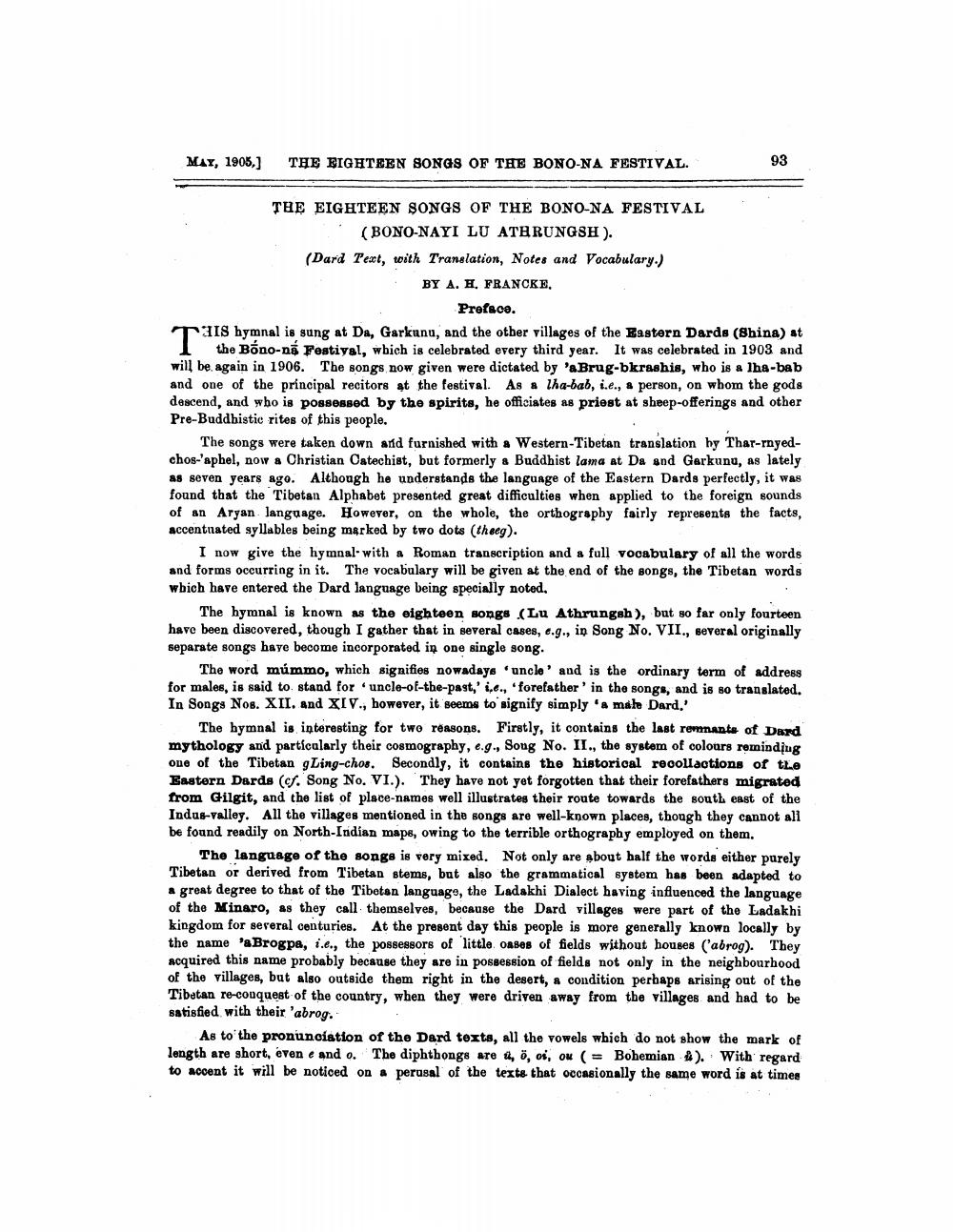________________
MAY, 1905,]
THE EIGHTEEN SONGS OF THE BONO-NA FESTIVAL.
93
THE EIGHTEEN SONGS OF THE BONO-NA FESTIVAL
(BONO-NAYI LU ATHRUNGSH). (Dard Text, toith Translation, Notes and Vocabulary.)
. BY A. H. FRANCKE.
Preface. Tus hymnal is sung at Da, Garkunu, and the other villages of the Eastern Dards (8hina) at
1 the Bono-ná Festival, wbich is celebrated every third year. It was celebrated in 1903 and will be again in 1906. The songs now given were dictated by 'a Brug-bkrashis, who is a lhs-bab and one of the principal recitors at the festival. As a lha-bab, i.e., & person, on whom the gods descend, and who is possessed by the spirits, he officiates as priest at sheep-offerings and other Pre-Buddhistic rites of this people.
The songs were taken down and furnished with a Western-Tibetan translation by Thar-rnyedchos-'aphel, now a Christian Catechist, but formerly & Buddhist lama at Da and Gerkunu, as lately as seven years ago. Although he understands the language of the Eastern Dards perfectly, it was found that the Tibetan Alphabet presented great difficulties when applied to the foreign sounds of an Aryan language. However, on the whole, the orthography fairly represents the facts, accentuated syllables being marked by two dots (theeg).
I now give the hymnal with a Roman transcription and a full vocabulary of all the words and forms occurring in it. The vocabulary will be given at the end of the songs, the Tibetan words wbich have entered the Dard language being specially noted.
The hymnal is known as the eighteen songs (Lu Athrungsh), but so far only fourteen have been discovered, though I gather that in several cases, e.g., in Song No. VII., several originally separate songs have become incorporated in one single song.
The word mummo, which signifies nowadays uncle' and is the ordinary term of address for males, is said to stand for uncle-of-the-past,' i..., 'forefather' in the songs, and is so translated. In Songs Nos. XII. and XIV., however, it seems to signify simply 'a mah Dard.'
The hymnal is interesting for two reasons. Firstly, it contains the last remnants of Dard mythology and particularly their cosmography, e.g., Song No. II., the system of colours reminding one of the Tibetan gLing-chos. Secondly, it contains the historical recollactions of the Eastern Dards (cf. Song No. VI.). They have not yet forgotten that their forefathers migrated from Gilgit, and the list of place-names well illustrates their route towards the south east of the Indus-valley. All the villages mentioned in the songs are well-known places, though they cannot all be found readily on North-Indian mape, owing to the terrible orthography employed on them.
The language of the songs is very mixed. Not only are about half the words either parely Tibetan or derived from Tibetan stems, but also the grammatical system has been adapted to a great degree to that of the Tibetan language, the Ladakhi Dialect having influenced the language of the Minaro, as they call themselves, because the Dard villages were part of the Ladakhi kingdom for several centuries. At the present day this people is more generally known locally by the name 'a Brogpa, i.e., the possessors of little cases of fields without houses ('abrog). They acquired this name probably because they are in possession of fields not only in the neighbourhood of the villages, but also outside them right in the desert, a condition perhaps arising out of the Tibetan re-conquest of the country, when they were driven away from the villages and had to be satisfied with their 'abrog.
As to the pronunciation of the Dard texts, all the vowels which do not show the mark of length are short, éven e and o. The diphthongs are tö, oi, ou (= Bohemian #). With regard to accent it will be noticed on a perasal of the texts that occasionally the same word is at times




